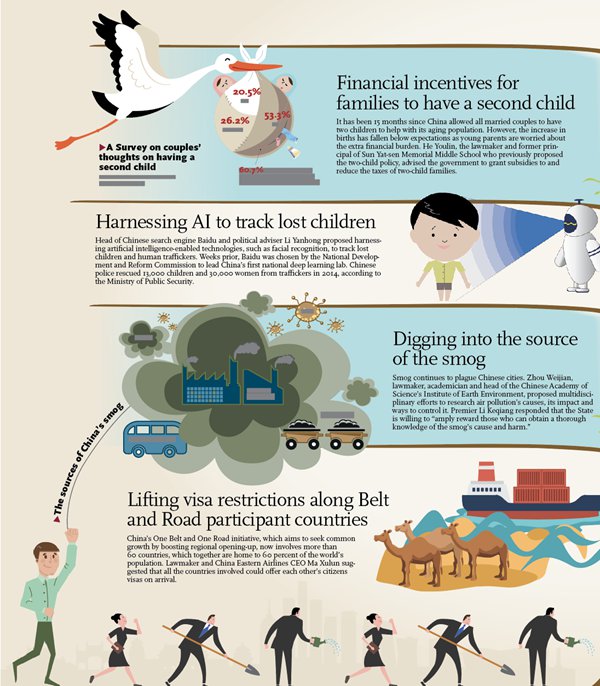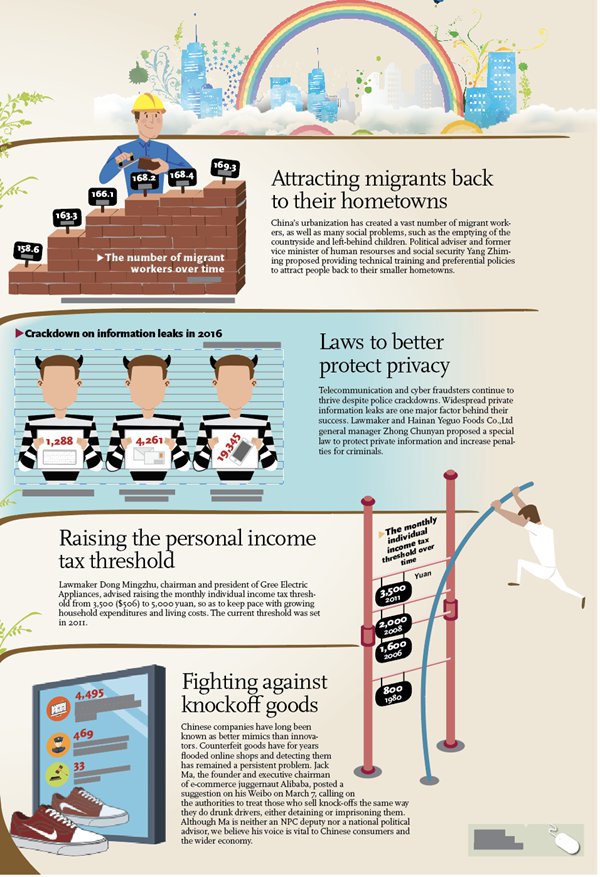Editor's note:
China concluded the annual two sessions of its national legislature and top political advisory body on Wednesday. From among the thousands of proposals and motions submitted by delegates, the Global Times has chosen eight that we believe may have the greatest impact on the livelihoods of Chinese people.


Financial incentives for families to have a second child
It has been 15 months since China allowed all married couples to have two children to help with its aging population. However, the increase in births has fallen below expectations as young parents are worried about the extra financial burden. He Youlin, the lawmaker and former principal of Sun Yat-sen Memorial Middle School who previously proposed the two-child policy, advised the government to grant subsidies to and reduce the taxes of two-child families.
Harnessing AI to track lost children
Head of Chinese search engine Baidu and political adviser Li Yanhong proposed harnessing artificial intelligence-enabled technologies, such as facial recognition, to track lost children and human traffickers. Weeks prior, Baidu was chosen by the National Development and Reform Commission to lead China's first national deep learning lab. Chinese police rescued 13,000 children and 30,000 women from traffickers in 2014, according to the Ministry of Public Security.
Digging into the source of the smog
Smog continues to plague Chinese cities. Zhou Weijian, lawmaker, academician and head of the Chinese Academy of Science's Institute of Earth Environment, proposed multidisciplinary efforts to research air pollution's causes, its impact and ways to control it. Premier Li Keqiang responded that the State is willing to "amply reward those who can obtain a thorough knowledge of the smog's cause and harm."
Lifting visa restrictions along Belt and Road participant countries
China's One Belt and One Road initiative, which aims to seek common growth by boosting regional opening-up, now involves more than 60 countries, which together are home to 60 percent of the world's population. Lawmaker and China Eastern Airlines CEO Ma Xulun suggested that all the countries involved could offer each other's citizens visas on arrival.
Attracting migrants back to their hometowns
China's urbanization has created a vast number of migrant workers, as well as many social problems, such as the emptying of the countryside and left-behind children. Political adviser and former vice minister of human resourses and social security Yang Zhiming proposed providing technical training and preferential policies to attract people back to their smaller hometowns.
Laws to better protect privacy
Telecommunication and cyber fraudsters continue to thrive despite police crackdowns. Widespread private information leaks are one major factor behind their success. Lawmaker and Hainan Yeguo Foods Co.,Ltd general manager Zhong Chunyan proposed a special law to protect private information and increase penalties for criminals.
Raising the personal income tax threshold
Lawmaker Dong Mingzhu, chairman and president of Gree Electric Appliances, advised raising the monthly individual income tax threshold from 3,500 ($506) to 5,000 yuan, so as to keep pace with growing household expenditures and living costs. The current threshold was set in 2011.
Fighting against knockoff goods
Chinese companies have long been known as better mimics than innovators. Counterfeit goods have for years flooded online shops and detecting them has remained a persistent problem. Jack Ma, the founder and executive chairman of e-commerce juggernaut Alibaba, posted a suggestion on his Weibo on March 7, calling on the authorities to treat those who sell knock-offs the same way they do drunk drivers, either detaining or imprisoning them. Although Ma is neither an NPC deputy nor a national political advisor, we believe his voice is vital to Chinese consumers and the wider economy.



